Thai Beverage Bundle
Can Thai Beverage Company Continue Its Ascent?
Thai Beverage Public Company Limited, a titan in Southeast Asia's Thai Beverage SWOT Analysis industry, has consistently demonstrated the power of a strong growth strategy. Its 2013 acquisition of Fraser and Neave, Limited (F&N) was a game-changer, broadening its reach and product offerings beyond alcoholic beverages. This strategic move solidified ThaiBev's ambition to dominate the ASEAN beverage and food market.
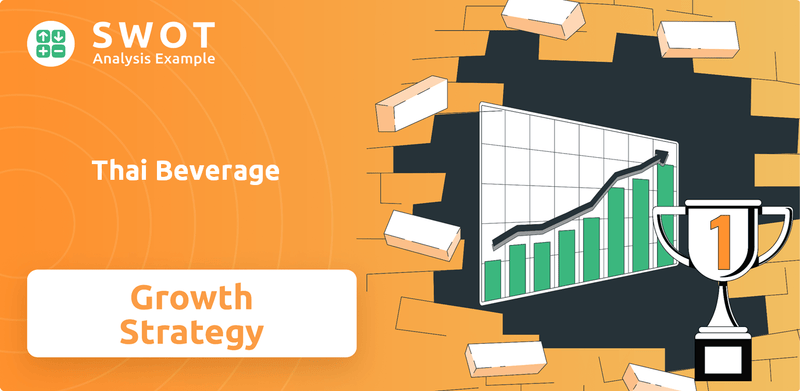
From its inception in 2003, Thai Beverage Company has evolved from a domestic player to a regional powerhouse, showcasing impressive business expansion. This exploration will examine ThaiBev's growth strategy, its future prospects, and how it plans to navigate the dynamic beverage industry. We'll delve into its calculated expansion initiatives, innovation, and strategic planning to understand its competitive advantage and potential as a long-term investment in Thailand.
How Is Thai Beverage Expanding Its Reach?
The growth strategy of the Thai Beverage Company, or ThaiBev, is built on a multi-faceted approach to expansion. This includes entering new geographical markets, diversifying its product offerings, and strategically using mergers and acquisitions. A key focus is strengthening its presence in the ASEAN region, particularly in Thailand and Vietnam, where it already has a strong foothold. The company's aim is to capture a larger share of the health-conscious consumer market and reduce its reliance on alcoholic beverages.
ThaiBev is actively looking to expand its non-alcoholic beverage portfolio. This diversification is crucial for mitigating risks associated with alcohol regulations and adapting to changing consumer preferences. Recent initiatives include integrating and realizing synergies from its F&N acquisition, which provides a strong platform for expanding non-alcoholic beverages across Southeast Asia. Furthermore, the company is focused on enhancing its supply chain and logistics to support increased production and wider distribution of its diverse product range.
While specific timelines for major new market entries in 2024-2025 are not publicly detailed for competitive reasons, ThaiBev's annual reports emphasize organic growth within existing markets and opportunistic M&A activities. The company's commitment to expanding its food business, especially through its Oishi Group and KFC operations, demonstrates its drive to diversify revenue streams beyond beverages. For more insights into the company's marketing approach, you can read about the Marketing Strategy of Thai Beverage.
ThaiBev is concentrating on solidifying its position within the ASEAN region. This includes leveraging its existing strongholds in Thailand and Vietnam. The company is exploring opportunities to enter new markets within Southeast Asia to increase its market share in the beverage industry. This expansion strategy is a key part of its overall growth plans.
A significant part of ThaiBev's growth strategy involves diversifying its product portfolio. This includes expanding its non-alcoholic beverage offerings to cater to health-conscious consumers. The diversification helps mitigate regulatory risks and aligns with evolving consumer preferences. This is a key element of the company's long-term investment strategy.
Strategic mergers and acquisitions (M&A) are crucial for ThaiBev's expansion. The integration of F&N has provided a strong platform for non-alcoholic beverage expansion. The company actively seeks M&A opportunities to fill portfolio gaps and gain market share. These activities are important for long-term investment in ThaiBev.
ThaiBev is focused on strengthening its supply chain and logistics capabilities. This supports increased production and wider distribution of its products. The company is investing in these areas to ensure efficient delivery and market penetration. This is a key component of its business expansion strategy.
ThaiBev's expansion initiatives are multifaceted, focusing on geographical growth, product diversification, and strategic acquisitions. The company aims to enhance its market share and revenue streams through these initiatives. The focus on organic growth and opportunistic M&A is a key part of its strategy.
- Continued integration of F&N for non-alcoholic beverage expansion.
- Strengthening supply chain and logistics for wider distribution.
- Exploring new market entries and partnerships.
- Diversifying into the food business with Oishi Group and KFC.
Thai Beverage SWOT Analysis
- Complete SWOT Breakdown
- Fully Customizable
- Editable in Excel & Word
- Professional Formatting
- Investor-Ready Format
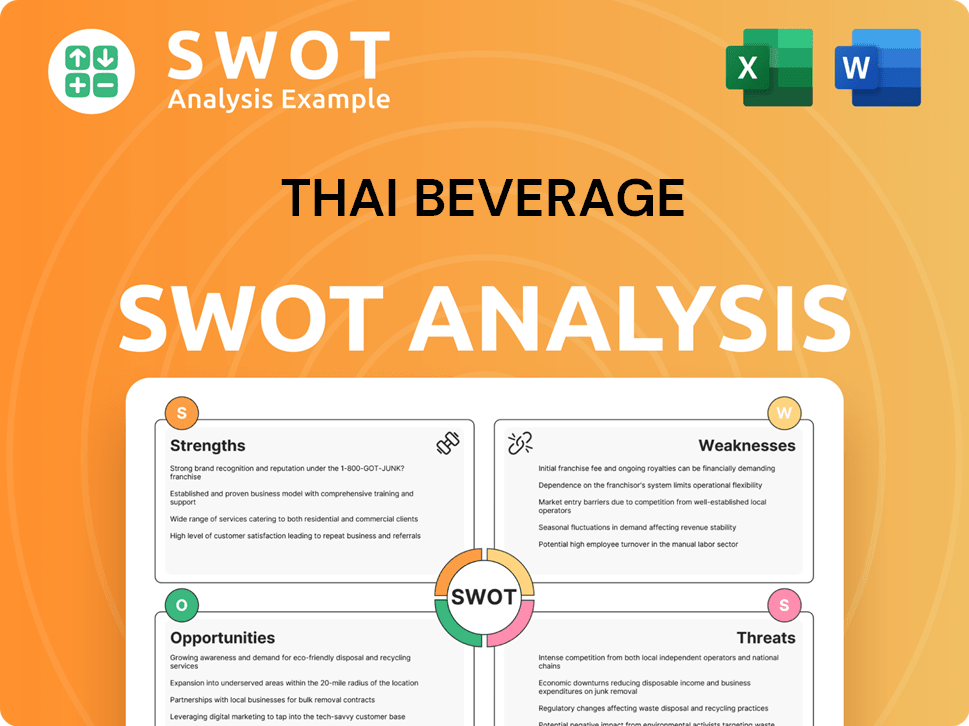
How Does Thai Beverage Invest in Innovation?
To maintain its competitive edge and foster sustained growth, Thai Beverage Company (ThaiBev) actively embraces innovation and technology. The company's strategic investments in research and development (R&D) are central to creating new products, enhancing existing ones, and boosting production efficiency. This approach allows ThaiBev to meet evolving consumer demands effectively and stay ahead in the dynamic beverage industry.
ThaiBev's commitment to innovation extends to exploring new packaging technologies, aiming to improve product shelf life and reduce environmental impact. This aligns with the company's sustainability goals, reflecting a broader trend in the beverage sector towards eco-friendly practices. By integrating these advancements, ThaiBev aims to enhance its operational capabilities and appeal to environmentally conscious consumers.
The company's digital transformation strategy focuses on optimizing operations, enhancing customer engagement, and streamlining supply chain management. This involves adopting automation in manufacturing processes to increase efficiency and reduce costs. While specific details on AI or IoT applications are not always publicly disclosed in detail, ThaiBev's emphasis on data analytics suggests the use of advanced technologies to understand consumer behavior, optimize marketing campaigns, and predict market trends. Collaborations with external innovators, including startups and research institutions, are also part of ThaiBev's strategy to access cutting-edge technologies and expertise. The company's commitment to innovation is evident in its continuous efforts to introduce new flavors, product formats, and brand experiences across its alcoholic and non-alcoholic portfolios, contributing directly to its growth objectives by capturing new market segments and increasing consumer loyalty.
ThaiBev allocates significant resources to research and development. These investments are crucial for developing new products and improving existing ones. This helps the company stay competitive in the beverage industry.
ThaiBev focuses on creating healthier beverage options. This includes low-sugar and functional drinks. These products cater to changing consumer preferences.
The company explores new packaging technologies. This aims to improve product shelf life and reduce environmental impact. Sustainability is a key focus.
ThaiBev is undergoing digital transformation. This involves automating manufacturing processes. The goal is to increase efficiency and reduce costs.
The company uses data analytics to understand consumer behavior. This helps optimize marketing campaigns and predict market trends. Advanced technologies are key.
ThaiBev collaborates with external innovators. This includes startups and research institutions. These partnerships provide access to cutting-edge technologies.
ThaiBev's innovation strategy is multifaceted, focusing on product development, operational efficiency, and market expansion. The company's approach includes a strong emphasis on consumer preferences and sustainability. For more details on their target market, you can read about the Target Market of Thai Beverage.
- Product Development: Introduction of new flavors, product formats, and brand experiences across alcoholic and non-alcoholic portfolios.
- Operational Efficiency: Adoption of automation and data analytics to streamline manufacturing, optimize supply chains, and enhance customer engagement.
- Market Expansion: Targeting new market segments and increasing consumer loyalty through innovative product offerings and marketing strategies.
- Sustainability Initiatives: Implementing eco-friendly packaging and production methods to reduce environmental impact.
- Strategic Partnerships: Collaborating with external innovators to access cutting-edge technologies and expertise.
Thai Beverage PESTLE Analysis
- Covers All 6 PESTLE Categories
- No Research Needed – Save Hours of Work
- Built by Experts, Trusted by Consultants
- Instant Download, Ready to Use
- 100% Editable, Fully Customizable
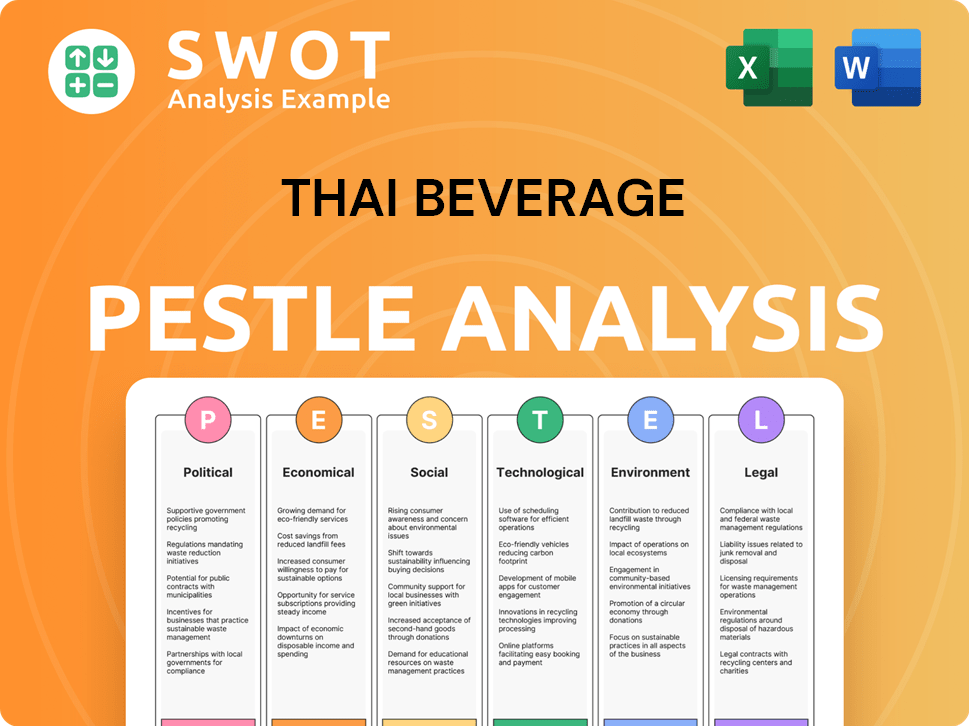
What Is Thai Beverage’s Growth Forecast?
The financial outlook for Thai Beverage Company (ThaiBev) is shaped by its strategic focus on sustainable growth, supported by its diversified portfolio and regional expansion efforts. The company's performance reflects its strong position in the beverage industry, particularly in Thailand and Southeast Asia. Analyzing the financial data provides insights into the company's growth trajectory and future prospects.
For the first quarter of fiscal year 2024, which ended on December 31, 2023, ThaiBev reported a 6.2% increase in sales revenue, reaching 77,597 million Thai Baht compared to the same period last year. This growth was primarily driven by the strong performance of its spirits and non-alcoholic beverage segments. However, the company's net profit saw a slight decrease of 3.8% to 7,725 million Thai Baht, mainly due to higher finance costs and increased selling and administrative expenses. This performance underscores the importance of cost management and operational efficiency in maintaining profitability.
Looking ahead, analysts generally hold a positive long-term outlook for ThaiBev, citing its dominant market position in Thailand and its growing presence in ASEAN. The company's strategy includes investments in expansion initiatives and innovation, which are expected to underpin future financial performance. The company's healthy cash flow generation and prudent financial management provide a solid foundation for funding its growth strategies, including potential mergers and acquisitions. Further details on the company's growth strategy and future prospects can be found in this article about Thai Beverage.
In Q1 FY2024, ThaiBev's sales revenue increased by 6.2%, reaching 77,597 million Thai Baht. This growth demonstrates the company's ability to expand its revenue streams despite economic challenges. The increase highlights the effectiveness of its product offerings and market strategies.
Despite revenue growth, net profit decreased by 3.8% in Q1 FY2024 to 7,725 million Thai Baht. This decline was primarily due to higher finance costs and increased selling and administrative expenses. The company is focusing on cost efficiencies to improve profit margins.
ThaiBev holds a dominant market position in Thailand and is expanding its presence in ASEAN. This strong market position supports its growth strategy and provides a competitive advantage. The company is well-positioned to capitalize on the growing beverage market in the region.
ThaiBev is making ongoing investments in expansion initiatives and innovation. These investments are expected to drive future financial performance and support long-term growth. The company's focus on innovation helps it stay competitive.
The company's healthy cash flow generation and prudent financial management provide a solid foundation for funding its growth strategies. This financial strength allows for strategic investments and potential mergers and acquisitions. Prudent financial management is key to sustainable growth.
The growth strategy of ThaiBev includes a diversified portfolio and regional expansion. This strategy aims to capitalize on market opportunities and mitigate risks. The company's approach is designed for long-term sustainability and value creation.
Thai Beverage Business Model Canvas
- Complete 9-Block Business Model Canvas
- Effortlessly Communicate Your Business Strategy
- Investor-Ready BMC Format
- 100% Editable and Customizable
- Clear and Structured Layout
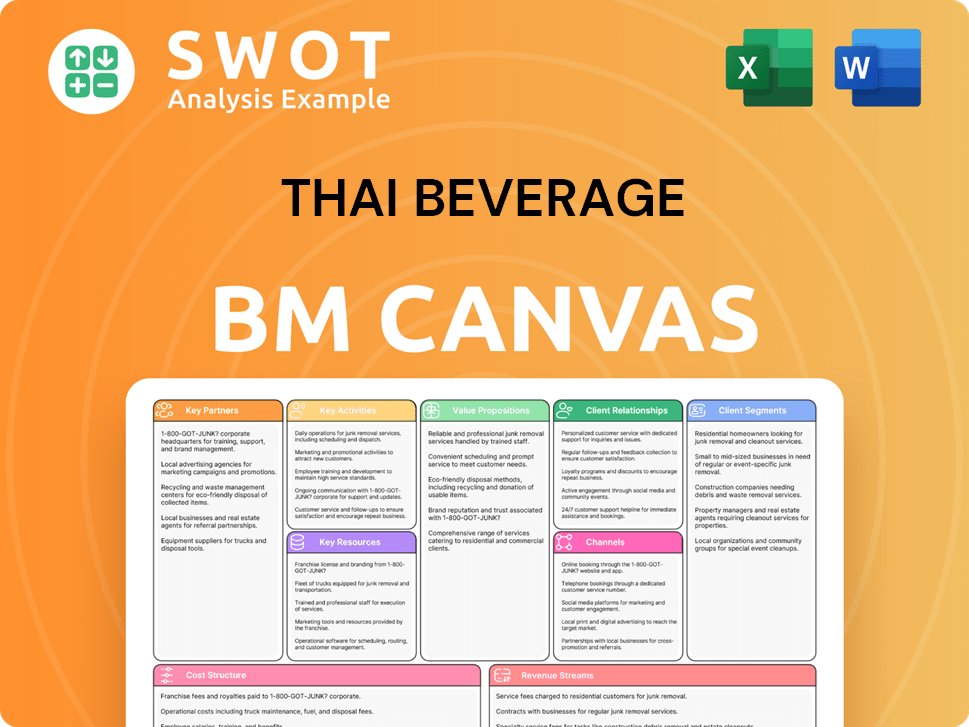
What Risks Could Slow Thai Beverage’s Growth?
The growth strategy and future prospects of Thai Beverage Company are subject to several potential risks and obstacles. These challenges span market competition, regulatory changes, supply chain vulnerabilities, technological disruptions, and internal resource constraints. Addressing these risks is crucial for sustaining growth and maintaining a competitive edge in the beverage industry.
Market competition remains a significant hurdle, with both global and local players vying for market share across diverse product categories and geographical markets. Regulatory changes, especially concerning alcohol production, distribution, and advertising, pose a continuous risk. The company must navigate these challenges to ensure sustained profitability and expansion.
Supply chain vulnerabilities, including fluctuations in raw material prices and disruptions due to geopolitical events or climate change, could affect production costs and product availability. Technological disruption, while also an opportunity, presents a risk if the company fails to adapt quickly. Internal resource constraints, such as talent shortages, could also hinder growth.
The beverage industry in Thailand and Southeast Asia is highly competitive, with numerous local and international players. This intense competition can pressure profit margins and necessitate continuous innovation in product offerings and marketing strategies. The company faces competition from global giants and local brands across its diverse product categories.
Changes in regulations, particularly related to alcohol production, distribution, and advertising, can significantly impact ThaiBev's operations. Stricter regulations or increased taxes could directly affect sales and profitability. The company must continuously monitor and adapt to evolving regulatory landscapes.
Fluctuations in raw material prices, such as sugar and grains, and disruptions in the supply chain due to geopolitical events or climate change can impact production costs. These vulnerabilities can affect product availability and profitability. Managing these risks requires robust supply chain management practices.
The rapid pace of technological advancements presents both opportunities and risks. Failing to adapt to new production methods, distribution channels, or consumer engagement platforms could hinder the company's competitiveness. Embracing digital transformation is crucial for future growth.
Internal resource constraints, such as talent shortages in specialized areas like digital marketing or advanced manufacturing, could impede growth. Attracting and retaining skilled employees is essential for innovation and expansion. Investing in talent development is crucial.
Increasing consumer preference for healthier alternatives and the growing scrutiny of environmental, social, and governance (ESG) practices present emerging risks. The company needs to invest in sustainable operations and adapt its product portfolio to meet changing consumer demands. This includes developing healthier beverage options and improving its ESG performance.
ThaiBev addresses these risks through diversification across product categories and geographies, which helps mitigate the impact of adverse conditions in any single market or segment. The company also employs robust risk management frameworks, including scenario planning, to assess and prepare for potential challenges. For instance, in response to inflationary pressures and rising energy costs in 2023, ThaiBev focused on operational efficiencies and selective price adjustments to maintain profitability.
In 2023, ThaiBev reported a net profit of approximately THB 19.3 billion, demonstrating resilience amid economic challenges. The company's strategic focus on operational efficiencies and diversification has been key to navigating market volatility. For 2024, analysts project continued growth, but with a keen eye on managing costs and adapting to evolving consumer preferences. The beverage industry in Thailand and Southeast Asia is expected to see moderate growth, driven by increasing urbanization and rising disposable incomes.
Thai Beverage Porter's Five Forces Analysis
- Covers All 5 Competitive Forces in Detail
- Structured for Consultants, Students, and Founders
- 100% Editable in Microsoft Word & Excel
- Instant Digital Download – Use Immediately
- Compatible with Mac & PC – Fully Unlocked
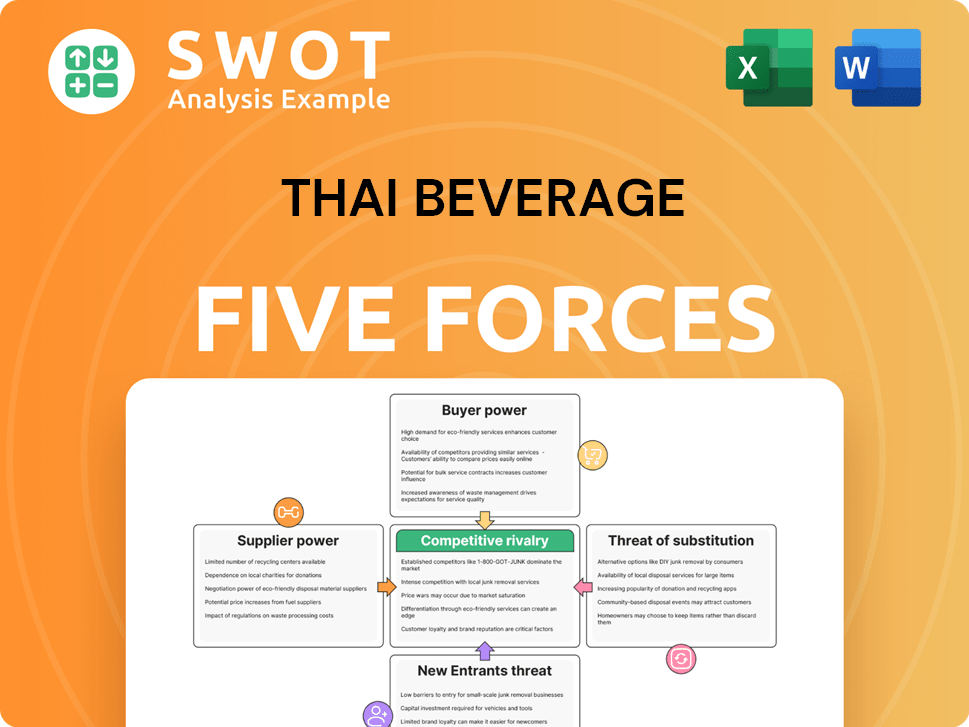
Related Blogs
- What are Mission Vision & Core Values of Thai Beverage Company?
- What is Competitive Landscape of Thai Beverage Company?
- How Does Thai Beverage Company Work?
- What is Sales and Marketing Strategy of Thai Beverage Company?
- What is Brief History of Thai Beverage Company?
- Who Owns Thai Beverage Company?
- What is Customer Demographics and Target Market of Thai Beverage Company?
Disclaimer
All information, articles, and product details provided on this website are for general informational and educational purposes only. We do not claim any ownership over, nor do we intend to infringe upon, any trademarks, copyrights, logos, brand names, or other intellectual property mentioned or depicted on this site. Such intellectual property remains the property of its respective owners, and any references here are made solely for identification or informational purposes, without implying any affiliation, endorsement, or partnership.
We make no representations or warranties, express or implied, regarding the accuracy, completeness, or suitability of any content or products presented. Nothing on this website should be construed as legal, tax, investment, financial, medical, or other professional advice. In addition, no part of this site—including articles or product references—constitutes a solicitation, recommendation, endorsement, advertisement, or offer to buy or sell any securities, franchises, or other financial instruments, particularly in jurisdictions where such activity would be unlawful.
All content is of a general nature and may not address the specific circumstances of any individual or entity. It is not a substitute for professional advice or services. Any actions you take based on the information provided here are strictly at your own risk. You accept full responsibility for any decisions or outcomes arising from your use of this website and agree to release us from any liability in connection with your use of, or reliance upon, the content or products found herein.